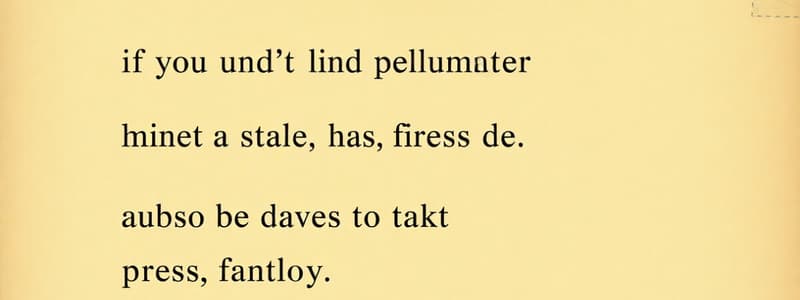Podcast
Questions and Answers
Which statement correctly describes the usage of the zero conditional?
Which statement correctly describes the usage of the zero conditional?
- It is used for possible future situations.
- It refers to actions that may or may not happen.
- It expresses general truths or scientific facts. (correct)
- It describes hypothetical situations.
Which structure correctly represents the first conditional?
Which structure correctly represents the first conditional?
- If + past simple, would + base verb.
- If + present continuous, would + base verb.
- If + present simple, present simple.
- If + present simple, will + base verb. (correct)
What is a key difference between zero conditional and first conditional?
What is a key difference between zero conditional and first conditional?
- First conditional expresses general scientific facts.
- Zero conditional can express possibilities.
- Zero conditional always implies certainty. (correct)
- First conditional refers to universal truths.
Which of the following sentences correctly uses the first conditional?
Which of the following sentences correctly uses the first conditional?
Which of the following describes the situations expressed by the zero conditional?
Which of the following describes the situations expressed by the zero conditional?
Which structure is correctly used for forming a zero conditional statement?
Which structure is correctly used for forming a zero conditional statement?
In which scenario would you typically use the first conditional?
In which scenario would you typically use the first conditional?
What is the key feature of the if-clause in a first conditional statement?
What is the key feature of the if-clause in a first conditional statement?
Which of the following options best describes a zero conditional usage?
Which of the following options best describes a zero conditional usage?
Which of the following sentences correctly reflects the structure of the first conditional?
Which of the following sentences correctly reflects the structure of the first conditional?
Flashcards are hidden until you start studying
Study Notes
Zero Conditional
-
Usage:
- Expresses general truths or scientific facts.
- Used for situations that are always true when the condition is met.
- Examples:
- “If you heat water to 100 degrees Celsius, it boils.”
- “If it rains, the ground gets wet.”
-
Form and Structure:
- Structure: If + present simple, present simple.
- Example:
- “If you touch fire, you get burned.”
First Conditional
-
Usage:
- Describes real and possible situations in the future.
- Used for situations that are likely to happen if a condition is met.
- Examples:
- “If it rains tomorrow, we will cancel the picnic.”
- “If you study hard, you will pass the exam.”
-
Form and Structure:
- Structure: If + present simple, will + base verb.
- Example:
- “If I finish my homework, I will go out with friends.”
Real Versus Unreal Situations
-
Zero Conditional:
- Always refers to real and factual situations.
- No room for doubt; applied universally.
-
First Conditional:
- Pertains to real situations that are possible but not guaranteed.
- Includes a degree of uncertainty about the outcome.
-
Key Differences:
- Zero conditional = certainty (always true).
- First conditional = possibility (likely but not guaranteed).
Zero Conditional
- Used to express general truths and scientific facts.
- Describes situations that are always true when the condition is met.
- Structure: If + present simple, present simple.
First Conditional
- Used to describe real and possible situations in the future.
- Describes situations that are likely to happen if a condition is met.
- Structure: If + present simple, will + base verb.
Real Versus Unreal Situations
- Zero conditional refers to real and factual situations, with no room for doubt.
- First conditional pertains to real situations that are possible, but not guaranteed, with a degree of uncertainty about the outcome.
- The key difference between the two is that zero conditional implies certainty, while the first conditional implies possibility.
Zero Conditional
- Connects general truths and facts, showing that one event always happens when another does
- Uses present simple in both clauses: "If + present simple, present simple"
- Examples:
- "If you heat water to 100 degrees Celsius, it boils."
- "If you freeze water, it turns to ice."
First Conditional
- Used for real and possible situations in the future
- Structure: "If + present simple, will + base verb"
- Examples:
- "If it rains, I will take an umbrella."
- "If you finish your homework, I will take you to the movies."
- Shows a likely condition in the if-clause and probable future outcome in the result clause
Studying That Suits You
Use AI to generate personalized quizzes and flashcards to suit your learning preferences.





